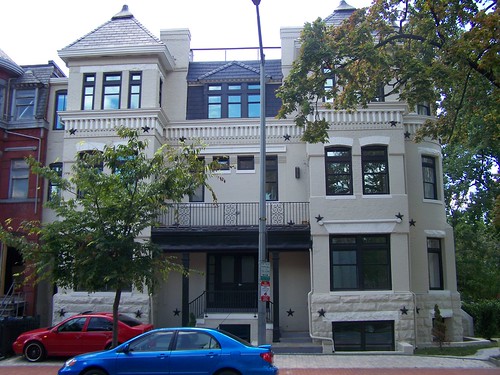1841 16th Street NW, Demolition by Neglect. Photo: 2009.
In 2009, I wrote a blog entry ("
Protest tonight (Monday): proposed demolition of 1841 16th Street NW") about a matter in the Dupont Circle area, where a house in the Dupont Circle Historic District had been mouldering, the city issued a demolition notice, and residents started protesting the possibility of demolition, as well as how the property owner was being irresponsible. Eventually, the owner either sold the property or something, but the process of fixing the building began, and there was no longer threat of demolition.
He says, "you know why they won, don't you? I said, "you tell me." "Because they protested." (There was a protest. I don't have photos. It was covered in GGW I think.)
"No," I said. "They won because it's a designated neighborhood, so they have legal protections in place, so that when they protested, there were remedies and actions that could be taken to get them the result that they want."
I then countered with an example in the Eckington neighborhood, where an 1880s (?) farmhouse had been demolished, when it too could have been rehabilitated, had the legal requirements been in place to force the property owner to take care of the property.
People don't seem to understand that when the law backs you, you can win. When it doesn't, it's very difficult to succeed, especially when your opponents are well financed.
I happened to go by the 16th Street property last week and I took a photo of it.
It basically proves the point that preservation laws do matter, that when you have remedies, it's possible to get the right outcomes. If the building would have been torn down, the lot would still be empty, and would be a scourge on the community. (The condemnation laws are screwed up, but that's another issue.)
Most of the time, there aren't remedies to "force" good and proper behavior in DC planning and zoning laws, which means that residents are out of luck when it comes to having substantial input into potentially problematic projects.
For example, "matter of right" means that the zoning classification "entitles" various types of uses, and vests various rights into the ownership of the property.
There are ways to add additional levels of review, such as with a big box review ordinance for something like a Walmart, but DC doesn't have that level of fine grain in most of the zoning and planning regulations.
Even the Large Tract Review process, as we came to learn, is mostly consultative, and only in extreme circumstances can a project be prevented.
That is no longer how it works: first, supermarkets now buy sites that were formerly pubs, bars or restaurants, so don't need planning permission. Sainsbury's says it doesn't have figures for how many of its acquisitions this applies to, and so does Tesco; but it was the case in Stokes Croft (the site was a comedy club) and St John's Hill, and I can think of three others in that part of London.
Supermarkets still have to apply for a premises licence, but the council even at this point is pretty toothless. Nick Griffin (a different one, as will quickly transpire) was part of the opposition to this Sainsbury's, and also a barrister: he laid out the legal grounds for opposition. Before 2003, there was generally an onus to prove that there was a need for another alcohol vendor in the area. Since the Licensing Act (which became law in November 2005), it's been up to the residents to object on one of four grounds: prevention of crime and disorder; public safety; protection of children from harm; prevention of public nuisance.
Griffin thought the last was the one most likely to succeed, but also knew that with a large, well-run, multinational company, none of these objections was likely to wash, and none did. One of the absurdities of the whole process is that the council invited local comment, put out chairs for the residents in the licensing committee meeting, and seemed well-disposed towards the locals, admiring their pluck (I'm extemporising now) – but it could only refuse to grant a licence within the law. And the law has no provision for people who just want their local shops to survive.
Residents are brought down to small acts of sabotage that look quite petty-minded: you can object to the highways department about the creation of a loading bay, but you'd need the council on your side. You can object on environmental grounds to the noise, but only once it's opened, and often small supermarkets aren't that noisy. Besides which, none of this is the point. ...
The thing about the US (compared to the UK, where many planning laws are national in scope although that may be changing) is that municipalities can have stronger or weaker laws, dependent on both state enabling legislation (this limits municipalities in Virginia for example, because they can only do things that are specifically authorized by the state legislature) and the strength of local organizing vis-a-vis the local growth coalition ("Growth Machine" theory, "Urban Regime" theory).
These two series from the Chicago Tribune, on zoning and on historic preservation, are particular good exposes about how real estate interests can shape these processes to their benefit.
In DC, the Growth Machine is strong and the citizenry are weak. As mentioned previously, the "
Selling Walmart" story by Lydia DePillis in the
Washington City Paper captures this dynamic very well.
So the opportunity for citizens to weigh in, especially when it really matters, is limited. People resort to "manipulating" the historic preservation laws to get their way when they can, because they are often the only tools that give citizens additional levels of input and protections in planning and building regulations.
But there is blowback, as the manipulation ends up making "historic preservation" look bad amongst various constituencies.





0 Comments:
Post a Comment
<< Home